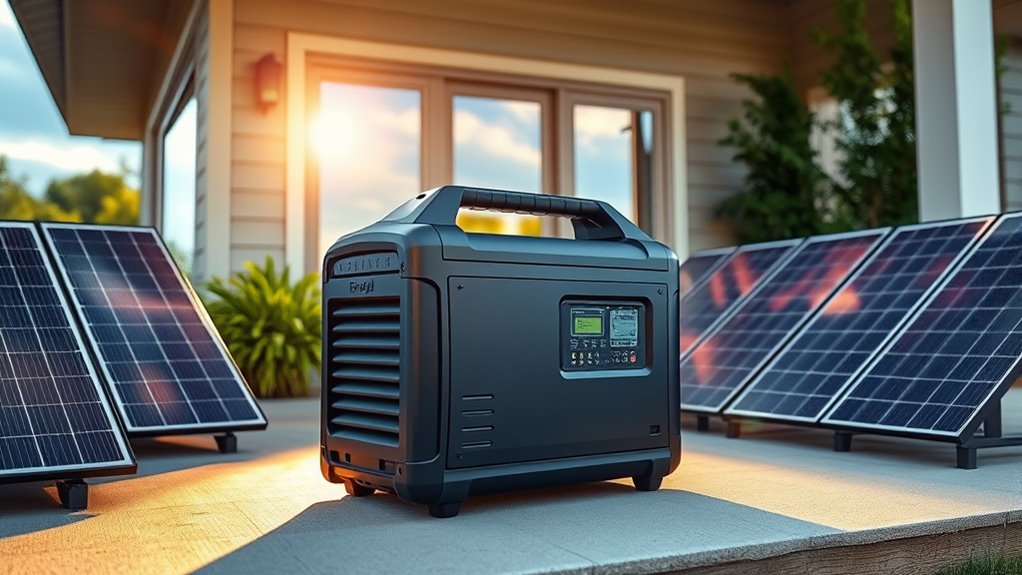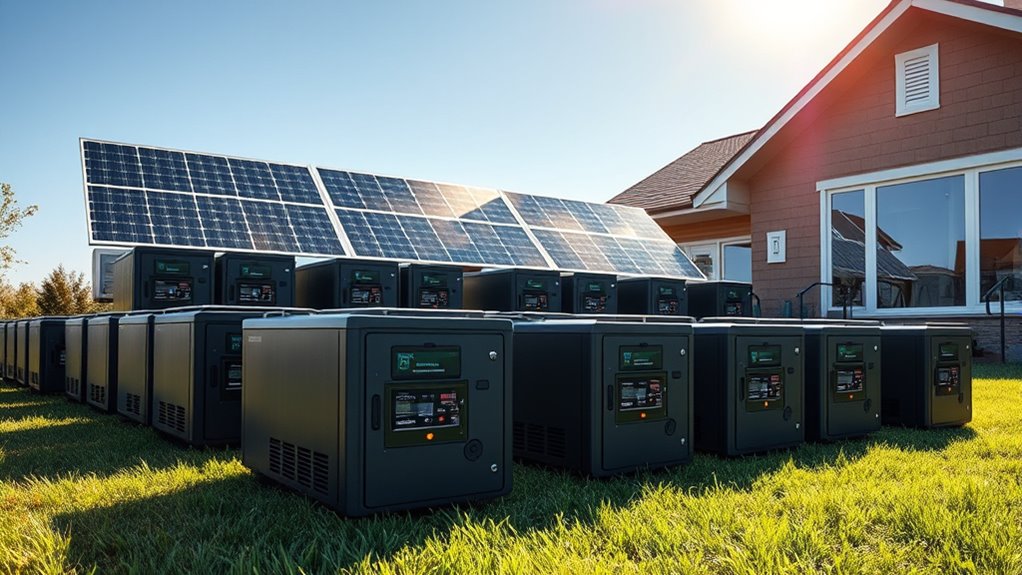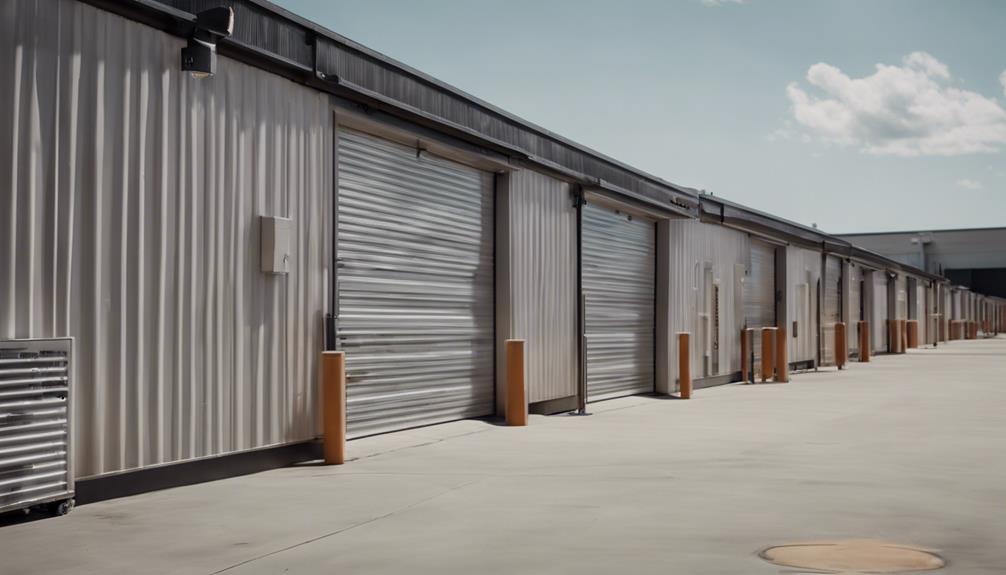If you’re looking for the best solar generators for home backup in 2025, I can help you narrow down the top options. I recommend considering units like the OUPES Mega 1, Vtoman bundle, and Jackery 2000 v2 for their high capacity, long-lasting LiFePO4 batteries, and fast recharging capabilities. These models support multiple devices and are portable enough for home and outdoor use. Keep exploring, and you’ll find the perfect fit for your sustainable power needs.
Key Takeaways
- Top solar generators in 2025 offer high capacity (up to 2042Wh) and fast recharging, ensuring reliable home backup power.
- Many models feature durable LiFePO4 batteries with over 4000 cycles, supporting long-term sustainability.
- Expandable units with additional batteries and multiple recharging options (solar, AC, car) enhance versatility for home use.
- Portable, lightweight designs with multiple outlets enable seamless powering of essential appliances during outages.
- Advanced features like seamless UPS switching, app control, and high surge capacity optimize home backup reliability.
OUPES Mega 1 Portable Power Station 2000W (4500W Peak), 1024Wh LiFePO4 Battery Generator
If you’re looking for a reliable power backup that can handle high-watt appliances during outages or outdoor adventures, the OUPES Mega 1 Portable Power Station is an excellent choice. It offers 2000W continuous power (4500W peak) and a 1024Wh LiFePO4 battery, expandable to 5120Wh with an extra battery. Perfect for home, camping, or RV use, it supports multiple devices with 13 outputs, including AC, USB-C, USB-A, and DC sockets. Charging options include solar, AC, or car, with fast recharging in just over 50 minutes. Its quiet operation and smart app control make it a versatile, safe, and efficient power solution.
Best For: outdoor enthusiasts, homeowners seeking reliable backup power, and RV travelers needing high-capacity portable energy solutions.
Pros:
- Powerful 2000W continuous output with expandable capacity for extended use
- Versatile charging options including solar, AC, and car, with fast recharge times
- Quiet operation and comprehensive app control for convenient monitoring and management
Cons:
- Slightly heavy at approximately 27.8 pounds, which may impact portability for some users
- Fan noise during high loads or charging can be noticeable, potentially disruptive indoors
- Higher initial cost compared to smaller or less capable portable power stations
Portable Power Station 600W (1200W Surge) with 576Wh (180,000mAh) Solar Generator
The DaranEner NEO600 stands out as an excellent choice for outdoor enthusiasts and emergency preparedness, thanks to its lightweight design and rapid recharge capabilities. Weighing just 6.6 pounds, it offers 576Wh of reliable power with a 600W continuous AC output (1200W surge), supporting multiple device ports like USB-C, USB-A, and DC. Its LiFePO4 battery ensures over 10 years of service, maintaining 70% capacity after 3,500 cycles. The NEO600 can be recharged in just an hour via AC, and it’s compatible with solar panels through durable MC4 connectors. Perfect for camping, backup power, or RV use, it delivers peace of mind wherever you go.
Best For: outdoor enthusiasts, emergency responders, and anyone needing reliable portable power for camping, home backup, or RV use.
Pros:
- Lightweight and portable at only 6.6 pounds for easy transport
- Fast 1-hour recharge via standard AC outlet, saving time during outdoor activities
- Long-lasting LiFePO4 battery with over 10 years of service and high cycle life
Cons:
- Solar connectors lack UL certification, suitable mainly for semi-permanent or low-current setups
- Stiff cables with minor fit issues may require careful handling during connection
- Rated for devices up to 600W; exceeding this can risk overload or damage
Anker SOLIX C1000 Portable Power Station (Optional Solar Panel)
The Anker SOLIX C1000 Portable Power Station stands out for its impressive 1800W continuous power output and fast recharge capabilities, making it an excellent choice for individuals seeking reliable backup power during outages or outdoor adventures. With a 1056Wh LiFePO4 battery, it supports multiple appliances, including microwaves, fridges, and heaters, thanks to SurgePad technology. Its compact design weighs just 27.6 pounds, and it features 11 outlets for versatile device charging. Recharging is ultra-fast—80% in 43 minutes—or eco-friendly via solar panels up to 600W, fully powering the unit in 1.8 hours. App control and durability guarantee long-term, reliable performance.
Best For: individuals seeking a reliable, portable power solution for home backup, outdoor adventures, or off-grid living with fast recharging and versatile device support.
Pros:
- High continuous power output of 1800W with peak 2400W, suitable for diverse appliances
- UltraFast recharging: 80% in 43 minutes and full in under an hour
- Compact, lightweight design at 27.6 pounds with 11 versatile outlets
Cons:
- Slight quirks in external expansion battery charging behavior
- Limited solar recharging capacity of up to 600W, which may be slow for larger energy demands
- Requires app control and firmware updates for optimal performance, which may be a learning curve for some users
Vtoman 2376Wh Portable Power Station Bundle with Extra Battery & Solar Panel
For anyone seeking a reliable, high-capacity power source for home backup or outdoor adventures, the Vtoman 2376Wh Portable Power Station Bundle stands out. It features an expandable capacity, reaching up to 2376Wh with the included extra battery, and uses durable LiFePO4 batteries rated for 3,000 full cycles. With 1500W rated output and peak 3000W, it can power essentials like coffee makers, electric grills, and small appliances. Weighing just 38.1 pounds, it’s portable and perfect for camping, RV trips, or emergencies. Charging is flexible, via solar with the foldable 200W panel, or AC, supporting green, off-grid energy.
Best For: outdoor enthusiasts, campers, RV travelers, and emergency preparedness individuals seeking a high-capacity, reliable portable power solution.
Pros:
- Large expandable capacity up to 2376Wh with included extra battery, suitable for extended use.
- Supports fast charging via solar panel or AC, with multiple output ports for versatile device compatibility.
- Durable LiFePO4 batteries offer over 3,000 full cycles, ensuring long-term reliability and safety.
Cons:
- The power station and solar panel are relatively heavy and bulky for some users to carry or store easily.
- Limited runtime under high loads may require additional batteries for extended power needs.
- Manual setup instructions may be challenging for some users due to language barriers.
Jackery Solar Generator 1000 v2 with Solar Panel
If you need a reliable portable power source that combines fast charging, high capacity, and versatility, the Jackery Solar Generator 1000 V2 with Solar Panel stands out as an excellent choice. It features a 1,070Wh LiFePO4 battery, over 10 years of lifespan, and a 1,500W AC output with a 3,000W surge. Weighing just 23.8 pounds, it’s easy to carry, with multiple ports including USB-C, USB-A, DC, and AC outlets. It charges from 0% to 100% in about 1.7 hours and supports solar recharging. Perfect for camping, home backup, or off-grid use, it delivers quiet, dependable power for essential devices.
Best For: outdoor enthusiasts, homeowners seeking reliable emergency backup, and off-grid users needing a portable, fast-charging power source.
Pros:
- High-capacity 1,070Wh LiFePO4 battery with over 10 years lifespan and 4,000+ charge cycles
- Fast recharging from 0% to 100% in about 1.7 hours using advanced ChargeShield 2.0 technology
- Multiple versatile ports including USB-C, USB-A, DC, and AC outlets for powering various devices
Cons:
- Weighs 23.8 pounds, which may be less portable for some users compared to smaller units
- Solar panel is sold separately, requiring an additional purchase for solar charging capabilities
- Limited to 1500W AC output, which may not support very high-wattage appliances
Jackery Solar Generator 2000 v2 with Solar Panels
Seeking a reliable backup power solution that combines high capacity with portability? The Jackery Solar Generator 2000 v2 offers 2,042Wh and 2,200W continuous output, making it perfect for home, camping, or small business use. It features fast USB-C PD charging, seamless UPS switching, and UL1778 certification for safety. Weighing only 39.5 pounds, it’s 41% lighter and 34% smaller than similar units, thanks to Cell-to-Body technology. Its durable LiFePo4 battery provides up to 10 years of reliable performance. With multiple charging options—including solar, AC, and simultaneous charging—it’s a versatile, eco-friendly backup for critical devices during outages.
Best For: individuals seeking a portable, high-capacity backup power solution for home use, camping, or small business needs with fast charging and eco-friendly features.
Pros:
- High capacity (2042Wh) and 2200W continuous output for powering multiple devices simultaneously
- Lightweight and compact design with Cell-to-Body technology for easier portability and space efficiency
- Fast recharging options via AC, solar, or combined methods, with seamless UPS switching for reliable backup power
Cons:
- Heavier than some portable units at 39.5 pounds, despite handle improvements
- Solar charging can be affected by weather conditions, extending recharge times
- Designed mainly for moderate to low-demand applications; may not support heavy industrial use
ALLPOWERS Portable Power Station with Solar Panel (R1500)
The ALLPOWERS Portable Power Station with Solar Panel (R1500) stands out as an excellent choice for anyone needing reliable, high-capacity backup power in emergency or outdoor situations. With 1800W of continuous power and a peak of 3000W, it can support up to 11 devices simultaneously, including appliances, laptops, and phones. Its LiFePO4 battery offers over 4000 charge cycles, ensuring long-term durability. Fast-charging capabilities allow 80% in just 40 minutes, and it’s compatible with solar input up to 650W for off-grid use. Compact and quiet, it’s perfect for camping, emergencies, or everyday backup, backed by a 6-year warranty and stellar customer ratings.
Best For: outdoor enthusiasts, emergency preparedness, and anyone needing reliable portable power for multiple devices in off-grid or backup scenarios.
Pros:
- High-capacity 1800W with peak 3000W, supporting up to 11 devices simultaneously
- Fast-charging from wall (80% in 40 min) and solar input up to 650W for versatile recharging options
- Long-lasting LiFePO4 battery with over 4000 charge cycles and a 6-year warranty
Cons:
- Relatively large dimensions (12.3L x 10.4W x 16.3H inches) may limit portability for some users
- Slightly higher upfront cost compared to smaller or less feature-rich power stations
- Limited to 650W solar input, which may require compatible solar panels for optimal use
OUKITEL P2001 Plus Power Station with 2400W/2048Wh Capacity
The OUKITEL P2001 Plus Power Station stands out with its robust 2400W continuous output and massive 2048Wh capacity, making it ideal for those who need reliable, long-lasting backup power at home or during outdoor adventures. Its high-quality LiFePO4 battery offers a lifespan of 15 years and over 3500 charge cycles, ensuring durability. With 13 versatile outlets—including AC, USB-C, USB-A, and DC—it can power most household appliances and devices. Fast charging options, both via AC and solar, allow for quick recharges in emergencies or on the go. Plus, its app control and UPS functionality provide seamless, remote management and uninterrupted power during outages.
Best For: outdoor enthusiasts, homeowners, and emergency preparedness individuals seeking reliable, long-lasting backup power with versatile charging options.
Pros:
- High-capacity 2048Wh lithium iron phosphate battery with a lifespan of 15 years and over 3500 charge cycles.
- Powerful 2400W continuous output capable of running most household appliances and devices.
- Fast recharge times via AC and solar input, with seamless app control and UPS functionality for uninterrupted power.
Cons:
- Relatively heavy at 47.5 pounds, which may impact portability for some users.
- Larger size may require additional storage space compared to smaller portable power stations.
- Higher upfront cost due to advanced features and large capacity.
AFERIY P210 Portable Power Station (2400W/2048Wh) with Solar & AC Charging
If you’re looking for a reliable backup power solution capable of handling large appliances, the AFERIY P210 Portable Power Station stands out with its impressive 2400W continuous output and 2048Wh battery capacity. Its LiFePO4 battery offers a 10-year lifespan and over 3,500 charge cycles, ensuring durability. With fast charging via AC (1100W) and solar (500W), it can recharge in about 2 hours. Supporting 16 versatile ports, including AC, USB, Type-C, and car outlets, it powers everything from refrigerators to small A/C units. Its pure sine wave inverter delivers clean power, while the app-enabled controls make monitoring and management effortless. Compact and lightweight, it’s perfect for home backup and outdoor use.
Best For: individuals seeking a reliable, high-capacity portable power solution for home backup, camping, or off-grid use to power large appliances and sensitive electronics seamlessly.
Pros:
- High continuous power output of 2400W and a large 2048Wh LiFePO4 battery with a 10-year lifespan
- Rapid recharging capabilities via AC (1100W) and solar (500W), often in just 2 hours
- Versatile ports including multiple AC outlets, USB, Type-C, and vehicle outlets for powering various devices simultaneously
Cons:
- Heavier weight (48.5 lbs/22 kg) may require assistance for transport
- Higher upfront cost compared to smaller or less capable portable power stations
- Limited runtime at full load, approximately 1 hour, which may require additional units for extended use
MARBERO Portable Power Station 88Wh Camping Lithium Battery
For outdoor enthusiasts and emergency preparedness kits, the MARBERO Portable Power Station 88Wh stands out with its compact size and versatile charging options. Weighing just 3.2 pounds and measuring 6.5 x 4.6 x 3.1 inches, it’s easy to carry on camping trips, road trips, or during power outages. It features 8 output ports—AC, DC, USB, and USB-C—allowing multiple devices to charge simultaneously. With fast charging from 0 to 80% in just 2 hours and support for solar, car, and AC inputs, it’s reliable for powering small appliances, electronics, and critical devices wherever you go.
Best For: outdoor enthusiasts, emergency preparedness kits, and travelers seeking a portable, reliable power source for small devices.
Pros:
- Compact and lightweight design, making it highly portable for outdoor and travel use
- Fast charging capabilities, reaching 80% in just 2 hours from zero
- Multiple charging options including solar, AC, and car inputs, with 8 output ports for versatile device charging
Cons:
- Potential battery degradation or malfunctions after prolonged moderate use
- Limited output power (peak 120W, rated 80W), restricting usage to small appliances and electronics
- Some users report issues with long-term durability and occasional power shutdowns
Portable Power Station 90,000mAh with 288Wh LiFePO4 Battery Backup
Anyone seeking a lightweight, reliable backup power source for outdoor adventures or emergency use will appreciate this portable power station’s high-capacity LiFePO4 battery, which offers 288Wh of energy and over 3,500 charge cycles. It supports continuous output of 350W and surge up to 600W, enough to power laptops, mini-fridges, cameras, and CPAP devices within 300W. Weighing just 8.16 pounds, it’s easy to carry, with multiple ports including AC outlets, USB-C, USB-A, and a 12V socket. Its durable design, smart safety features, and eco-friendly recharging options make it perfect for camping, RV trips, or emergency backup.
Best For: outdoor enthusiasts, campers, and emergency preparedness individuals seeking a lightweight, reliable power backup for small to medium devices.
Pros:
- High-capacity 288Wh LiFePO4 battery with over 3,500 charge cycles ensures long-term reliability
- Multiple versatile outputs including AC, USB-C, USB-A, and 12V socket for wide device compatibility
- Compact, lightweight design weighing only 8.16 lbs with durable impact-resistant construction and user-friendly features
Cons:
- Limited continuous output of 350W may not support high-power appliances beyond small electronics
- Some users report issues with battery malfunctioning and customer service responsiveness
- Recharging via solar panel requires additional purchase of compatible 40W solar panel for eco-friendly use
Jackery Portable Power Station Explorer 300
The Jackery Portable Power Station Explorer 300 stands out as an ideal choice for outdoor enthusiasts and emergency preppers seeking reliable, portable power. Weighing just 7.1 pounds, it packs a 293Wh lithium-ion battery capable of powering up to six devices simultaneously, including laptops, drones, and cameras. Its multiple ports—AC outlets, USB-C, USB-A, and car socket—offer versatile charging options. With quick recharging via wall, car, or solar in about 4.5-5.5 hours, it ensures peace of mind during outages or outdoor adventures. Its safety features and durable design make it a trusted, eco-friendly power backup for various situations.
Best For: outdoor enthusiasts, emergency preppers, and travelers seeking a lightweight, reliable portable power source for multiple devices.
Pros:
- Compact and lightweight design (7.1 pounds) for easy portability
- Multiple versatile charging ports including AC, USB-C, USB-A, and car socket
- Fast recharging options via wall, car, or solar in about 4.5-5.5 hours
Cons:
- Limited to a 293Wh capacity, which may not power larger appliances for extended periods
- Max continuous power output of 300W, so not suitable for high-wattage devices
- Longer full recharge time compared to some competitors when approaching 100% capacity
ALLWEI 2400W LiFePO4 Portable Power Station
The ALLWEI 2400W LiFePO4 Portable Power Station stands out with its impressive 2048Wh capacity and rapid recharging ability, making it an excellent choice for those needing reliable backup power during outages or outdoor adventures. It features a 2400W pure sine wave inverter, capable of surging to 3600W, and can recharge to 80% in just 60 minutes. With 11 output options—including AC outlets, USB-C, and a 30A RV port—it’s versatile enough for multiple devices. Its durable LiFePO4 battery offers over 3,500 cycles and 10-year lifespan. Plus, expandable with up to four battery packs, it ensures extended power wherever you go.
Best For: outdoor enthusiasts, homeowners seeking reliable backup power, and RV travelers needing portable, versatile energy solutions.
Pros:
- Fast recharging capability (up to 80% in 60 minutes) for quick power top-ups
- Expandable design allowing up to four additional battery packs for extended use
- Multiple output options including AC, USB-C, and RV port for versatile device compatibility
Cons:
- Heavy weight of 50 pounds may be challenging to carry for some users
- Higher upfront cost compared to smaller portable power stations
- Limited solar input capacity (up to 80W), which may slow down solar recharging in off-grid situations
2400W Portable Power Station with 1500Wh Battery and Solar Generator
A 2400W portable power station with a 1500Wh battery and solar compatibility is ideal for those seeking reliable, high-capacity backup power. It supports over 10 devices at once, with multiple outlets including AC, USB-C, USB-A, fast-charging USB, and a 12V socket. Its advanced BMS system protects against overheating, short circuits, and overcharging, ensuring durability over 10 years and 2,000+ charge cycles. It charges rapidly—about 1.5 hours from mains and 2-3 hours via solar—thanks to an efficient MPPT controller. Perfect for home backup, outdoor adventures, or RV use, it combines power, portability, and smart design seamlessly.
Best For: outdoor enthusiasts, emergency prepper, and travelers needing reliable, high-capacity portable power to run multiple devices and appliances simultaneously.
Pros:
- Supports over 10 devices at once with multiple outlets including AC, USB-C, USB-A, and 12V socket.
- Rapid charging capabilities—fully charges in about 1.5 hours from mains and 2-3 hours via solar.
- Durable build with a 10-year warranty and over 2,000 charge cycles, ensuring long-term reliability.
Cons:
- Heavier at around 32 pounds, which may be less convenient for frequent portability.
- Higher upfront cost compared to smaller or less powerful portable power options.
- Requires access to mains or sufficient sunlight for optimal solar charging, limiting use in low-light conditions.
EF ECOFLOW Portable Power Station DELTA2 with Smart Extra Battery
For homeowners seeking reliable backup power with rapid recharging, the EF ECOFLOW Portable Power Station DELTA2 with Smart Extra Battery stands out. It offers expandable capacity from 1024Wh to 2048Wh, powering over 90% of household appliances with a 1800W AC output and X-Boost technology that handles devices up to 2200W. Thanks to its fast X-Stream charging, it reaches 80% in just 50 minutes and fully recharges in around 80 minutes using solar or AC power. Designed for durability, it boasts over 3000 charge cycles and can support up to 15 devices simultaneously, making it a versatile, long-lasting backup solution.
Best For: homeowners and outdoor enthusiasts seeking a reliable, fast-charging, and expandable portable power solution for backup power, camping, or off-grid use.
Pros:
- Rapid X-Stream charging technology provides 80% power in just 50 minutes.
- Expandable capacity up to 2048Wh with additional batteries, supporting multiple devices simultaneously.
- Durable LFP battery chemistry with over 3000 charge cycles, ensuring long-term reliability.
Cons:
- Some users report issues with solar charging efficiency and app control features.
- Customer service and warranty claim processes can be slow or inconsistent.
- Heavier weight (54 pounds), which may affect portability for some users.
Factors to Consider When Choosing Solar Generators for Home Backup

When choosing a solar generator for your home backup, I focus on the power capacity you need to run essential appliances. I also consider battery technology, charging options, and the variety of ports to guarantee versatility. Ultimately, expandability potential matters so you can upgrade your system as your needs grow.
Power Capacity Needs
Choosing the right solar generator depends heavily on understanding your power capacity needs. First, I recommend listing all essential appliances you want to run simultaneously and calculating their total wattage. Don’t forget to take into account surge or peak wattage for devices like refrigerators or air conditioners, which require short bursts of power. Next, match the generator’s capacity—measured in watt-hours or amp-hours—to how long you’ll need backup power, especially during extended outages. If you plan on running multiple devices over several hours, make certain the battery capacity can support that. Finally, check the solar input capacity to verify it can recharge your generator efficiently, considering your sunlight availability. This careful assessment guarantees you select a generator that meets your home’s backup power needs reliably.
Battery Technology Types
Selecting the right battery technology is essential for ensuring your solar generator meets your home backup needs. Lithium Iron Phosphate (LiFePO4) batteries stand out for their durability, offering over 3,000 to 4,000 charge cycles, which means a longer lifespan than traditional lithium-ion batteries that typically last 500 to 1,000 cycles. LiFePO4 batteries are also known for their thermal and chemical stability, reducing fire risks. They support fast recharges in under two hours, though recharge times can vary. In contrast, lithium-ion batteries are more compact and lightweight but may not last as long. Overall, choosing the appropriate chemistry depends on your safety, longevity, and performance priorities, ensuring your home backup system is reliable and sustainable over time.
Charging Speed Options
Fast charging options can dramatically improve a solar generator’s practicality, especially during emergencies or outdoor adventures. High-wattage input ports, like 1100W or 1500W, enable rapid recharging, often fully replenishing the unit in as little as 43 minutes to 80%. This reduces downtime and ensures power availability when it’s most needed. Solar charging speed depends on panel wattage, sunlight conditions, and the efficiency of the MPPT controller—bigger panels deliver faster recharge times. Some generators support simultaneous charging from multiple sources, such as AC, solar, and car outlets, further speeding up recharging. Quick charging options are essential for maintaining reliability and convenience, making them a critical factor when selecting a backup power solution for your home.
Port Selection Variety
A solar generator’s port selection substantially impacts how effectively it can power your home during outages. A variety of ports—AC outlets, USB-C, USB-A, DC, and car lighters—ensures compatibility with multiple devices and appliances. Having multiple port types allows me to charge critical electronics like laptops, phones, and small appliances simultaneously. Some models include dedicated high-wattage outlets (1500W or more) to support larger appliances such as refrigerators or electric heaters. The inclusion of diverse charging options, including solar, AC, and car inputs, provides flexible recharging in different backup scenarios. Port variety enhances usability during emergencies by enabling seamless power transfer to various devices without needing extra adapters. This flexibility ensures I can keep essential devices running when it matters most.
Expandability Potential
When evaluating a solar generator for home backup, considering its expandability potential is essential because it determines how well the system can grow to meet increasing energy demands. Many models allow you to add extra batteries or modules, effectively doubling or tripling runtime for longer use. Linking multiple batteries through dedicated ports or daisy-chaining systems makes scaling straightforward, letting you customize energy storage based on your needs. This flexibility is especially important for long-term off-grid living, emergency preparedness, or powering high-wattage appliances over extended periods. Modular designs and compatible connectors, such as Y-branch cables or expansion ports, make adding capacity seamless. Always check the maximum number of supported batteries and total system capacity to guarantee your setup can grow with your evolving energy requirements.
Portability and Size
Choosing the right solar generator for home backup involves carefully balancing portability with power capacity. If you need a model for outdoor use or emergency transport, look for lightweight options under 30 pounds, which are easier to carry and manage. Compact designs that fit into storage spaces or backpacks are ideal if space is limited, but be sure they still provide enough power for your needs. Many portable units feature ergonomic handles, foldable panels, or streamlined cases that make handling simpler. Keep in mind, size affects battery capacity and the number of output ports—smaller models might have less runtime or fewer connections. Ultimately, you want a generator that’s easy to move but still meets your power requirements without sacrificing essential features.
Safety and Durability
Selecting a solar generator for home backup means paying close attention to safety and durability features. I recommend choosing units with LiFePO4 batteries, which provide over 3,500 charge cycles and last more than ten years, ensuring long-term reliability. An advanced Battery Management System (BMS) is essential; it monitors voltage, current, and temperature to prevent overcharge, over-discharge, and overheating. Look for models with UL or ETL certification, confirming they meet strict safety standards and reducing fire or electrical fault risks. Safety features like automatic shut-off, short-circuit protection, and overload safeguards protect both your devices and you. Additionally, opt for portable units with durable, weather-resistant casings, such as IP67 ratings, to withstand outdoor conditions and prevent damage.
Price and Warranty
A longer warranty period, typically between 5 and 10 years, shows that a manufacturer stands behind their product’s durability and quality. Higher-priced solar generators usually come with extensive warranties covering repairs, replacements, and technical support for extended periods, which can save you money and hassle over time. Some warranties explicitly include battery lifespan, with LiFePO4 batteries lasting around 3,000 to 4,000 charge cycles before noticeable capacity loss. It’s vital to read the fine print to understand what’s covered and what’s not, especially regarding damage from misuse, environmental factors, or improper maintenance. Choosing a generator with a reliable warranty and dependable customer support gives me peace of mind and guarantees my investment is protected throughout its lifespan.
Frequently Asked Questions
How Long Do Solar Generators Typically Last Before Needing Replacement?
You’re wondering how long solar generators last before needing replacement. In my experience, most solar generators have a lifespan of about 10 to 15 years, depending on usage and maintenance. The batteries tend to wear out first, often after 3 to 5 years, but quality units can last longer with proper care. Regularly checking and maintaining your generator can extend its life, ensuring you get the most out of your investment.
Are Solar Generators Safe for Home Use During Storms or Extreme Weather?
I’ve looked into it, and solar generators are generally safe during storms or extreme weather, but with some precautions. They’re designed to handle weather fluctuations, yet heavy rain or lightning can cause issues. I recommend disconnecting them during severe storms to prevent damage. Think of them as a reliable backup, but not invincible—always follow manufacturer safety guidelines and keep them sheltered during extreme conditions for ideal safety.
Can Solar Generators Power High-Energy Appliances Like HVAC Systems?
You’re wondering if solar generators can handle high-energy appliances like HVAC systems. I’ve found that most portable solar generators aren’t designed for such heavy loads, especially continuous ones like HVAC. They’re great for small devices or emergencies, but for powering high-energy appliances, you’ll need a more robust, specialized solar power system. Always verify the wattage and make sure your generator matches your appliance’s power requirements before relying on it.
What Maintenance Is Required for Optimal Solar Generator Performance?
Think of my solar generator like a car—regular check-ups keep it running smoothly. I clean the solar panels every few months to remove dust and debris, ensuring maximum efficiency. I also inspect cables and connections for damage and keep the battery charged but not overcharged. Following these simple steps helps me maintain peak performance, much like tuning a car for a long road trip, so I can rely on my generator when I need it most.
How Do Solar Generator Warranties Compare Between Brands?
When comparing solar generator warranties, I find it’s important to look at what’s covered and for how long. Some brands offer warranties up to 10 years, covering components like batteries and inverters, while others might have shorter terms or limited coverage. I always check the fine print, as better warranties give me peace of mind knowing my investment is protected against manufacturing defects and early failures.
Conclusion
Choosing the right solar generator can truly keep my home powered sustainably during outages. Did you know that solar energy can decrease household carbon footprints by up to 30%? With options like the OUPES Mega 1 or Jackery Solar Generator 1000 v2, I can guarantee reliable backup power while helping the environment. Investing in a quality solar generator means peace of mind, savings, and a greener future—what’s not to love?










